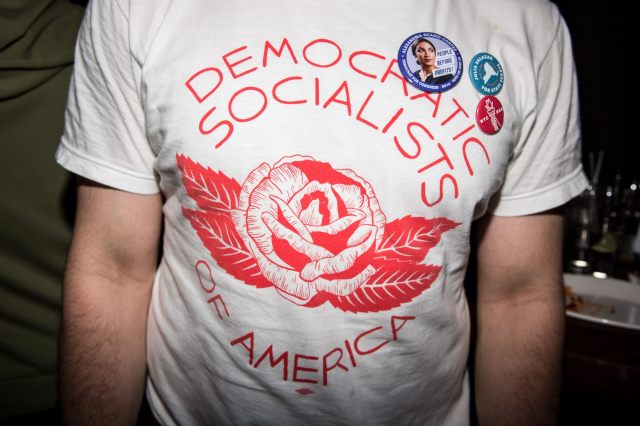Credit: by Scott Heins/Getty Images

Can America, the land of the free and the most anti-government nation in the West, embrace socialism? That’s what a hardy band of left-wing Democrats want, and some recent victories within Democratic primary contests have left many wondering if they might be right.
The surprise victory of 28-year old Alexandra Ocasio-Cortez, a self-described democratic socialist, over longtime Democratic House member Joe Crowley, in the Democratic primary in New York’s 15th Congressional District has brought this to the public eye. Ocasio-Cortez won despite being massively outspent by her opponent, who was the fourth ranking member of the Democratic leadership. Since her triumph, she has become a national political figure – decried by the Right and a subject of wonder on the centre-Left. America has long resisted the socialist label: does Ocasio-Cortez’s victory mean this might be changing?
Probably not, but it does show that the Democratic Party is changing. Between democratic socialists and Bernie Sanders’ ‘progressives’, it’s clear that the party is fast moving leftward. Most serious contenders for the 2020 Democratic Presidential nomination are now moving to adopt policies that these groups champion, including universal, government-financed health insurance. Democrats are gearing up for a battle over their party’s soul.
Centre-left Democrats believe their more left-wing colleagues are moving too far, too fast in the direction of big government. It’s not that they disagree with some the leftists’ aims, like universal health care, but that they see the virtues of America’s private sector and are less willing to directly challenge the sentiments of independent voters.
They remember the last – and only – time the favourite of the party’s Left has won the Democratic nomination for president. That man, George McGovern, went on to lose the presidency in 1972 in a record-setting landslide, winning only 37.5% of the vote and just one state, Massachusetts. Granted, the country has moved to the Left since then, but centre-left Democrats fear that it hasn’t moved far enough to enable a full-blown leftist, much less a socialist, to triumph. And a failure to take the White House would mean four more years of Donald Trump and a Republican Congressional majority working to dismantle many of the programmes and achievements the centre-Left built.
The pressure from the Left, however, is already having an effect, and whoever wins the nomination will certainly be among the most left-wing major party nominees in American history – even if that person is the centre-Left’s favourite. For a British comparison: the Democratic centre-Left is like New Labour after Gordon Brown’s defeat. To hold power within the party means shifting to the Left, selecting Ed Miliband over his brother David.
As British readers know, that move did nothing to save New Labour. “Red Ed” was too left-wing for the centre, leading to David Cameron’s surprise majority win. Two groups of swing voters secured that Conservative victory – middle-class moderates and working-class voters keen on leaving Europe. Neither found anything to like in Miliband.
American politics has those two groups of people as well. The middle-class moderates are former Republicans who find President Trump offensive. These “Romney-Clinton” voters – so-called because of the votes they cast in 2012 and 2016, respectively – don’t want to move to the hard Left, they may even find the soft Left unappealing. But no Democratic nominee can win without their votes. The socialist surge, therefore, increases the chance of a Trump re-election and everything that entails.
The other group is the polar opposite of these people: “Obama-Trump” voters. These are blue-collar, working-class whites – in British terms, the sort of people who after 2005 abandoned Labour for UKIP or the Tories, feeling like their concerns about wage stagnation and immigration were being ignored. Much as Labour refused to take immigration seriously in the 2010 and 2015 elections, the Democratic Left has refused to acknowledge concerns in the United States. Indeed, Ocasio-Cortez and a growing number of fellow leftist Democrats advocate the total abolition of the government agency entrusted with border enforcement (ICE). No candidate who embraces that position can win back blue-collar former Democrats, they will only drive them further into Trump’s waiting arms.
The Democrat’s increasing attraction to the Left-wing of their party, then, is pushing the US towards a political divide that will be familiar to Britons: a party of the cultural and economic Left faces a party of the nationalist Right, leaving middle-class and upscale voters of the centre without serious representation. Party members on the Left and the Right in both countries increasingly sees the other as enemies rather than adversaries. In America, this division would only increase should Trump win a second term.
These developments are somewhat masked in this year’s midterms, as most of the high-profile races are in marginal districts and state races feature less extreme candidates on both sides. But in the safe seats whose control always presages a change in the party’s soul, the sounds are ominous. Republican candidates in party primaries are engaged in sometimes laughable efforts to pledge every greater loyalty to Trump and his agenda, especially his pledge to build a wall on the southern border with Mexico. While Democratic safe seats are being won by democratic socialists or progressives (two other democratic socialists won safe seats in the Pennsylvania state legislature, defeating long-time centre-Left incumbents).
Moderate voices in each party are slowly being shunted aside in favour of those who view politics as war by other means. It is a trend that echoes the hard political clashes of the early 20th Century, rather than the more consensual clashes that typified the post-1945 West. We must hope that this time around, the West deals with its paradigm-changing challenges more effectively.










Join the discussion
Join like minded readers that support our journalism by becoming a paid subscriber
To join the discussion in the comments, become a paid subscriber.
Join like minded readers that support our journalism, read unlimited articles and enjoy other subscriber-only benefits.
Subscribe